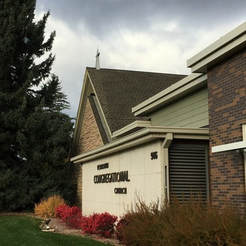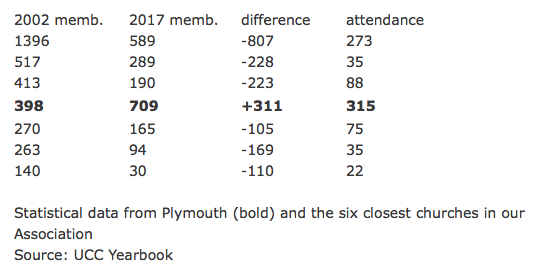 Most of us at Plymouth probably don’t read a whole lot about the decline of mainline Protestantism, a persistent trend that started in the 1960s, but many of us who are active in ordained ministry cannot help but encounter the deluge of such articles. Perhaps the most ominously titled article was a 2017 piece in the Washington Post: “If It Doesn’t Stem Its Decline, Mainline Protestantism Has Just 23 Easters Left.” Of course, that’s a projection based on aggregate national statistics, not the stories of individual congregations. The story at Plymouth is a positive one. So, you would be forgiven any assumption that mainline churches are doing just fine. The story at the UCC churches closest to Plymouth is unfolding differently. There are six UCC churches nearby in our Association. Some are healthier than others, but according to the UCC Yearbook, each has declined by more than 100 members over the past 15 years. (See chart) In fact, Plymouth is the only church that has grown in membership. The prognosis for many smaller congregations in the UCC is not encouraging. Larger congregations, like the one Plymouth is becoming, are more resilient in the face of demographic changes and moments of financial insecurity like the 2007 recession. No one has a crystal ball, but I am not hopeful that more than a handful of the UCC churches in our Association will be here in 20 years. While some members are ambivalent about our congregation growing, I know that all of us want Plymouth to keep making a difference in our community and in the lives of our members, and I’m confident that our future is bright as an outpost of the Kingdom of God. The reasons for mainline decline are complex: fewer young people raised in the faith stay here; our birthrate is unusually low; anti-institutionalism, we get tarred with the same brush when sex-abuse is unearthed and organized religion gets the blame for the 9/11 attacks, and some folks want black-and-white rather than nuanced approaches to biblical interpretation and faith. Research from Hartford Seminary’s FACT survey also indicates that many mainline congregations struggle with a lack of clarity about who they are and also demand little of their adherents. There is something harder to define in healthy congregations: a culture of being ready and able to handle conflict healthily when it arises. (And it arises in every congregation.) A key component of working creatively and effectively with conflict is a culture of open communication. Three hallmarks are identified by Kibbie Ruth and Karen McClintock in their 2007 Alban Institute book, Healthy Disclosure: Solving Communications Quandaries in Congregations: reducing triangulation, reducing pass-through communication, and eliminating anonymous feedback. All of this takes courage and trust…which are hallmarks of our faith and evolved spirituality. (See Eph. 4.15 and Matt. 18-15-17) Triangulation happens when someone wants to make a comment to another person but cannot muster the courage to stand face-to-face and gently, assertively share that information. Instead, they take the seemingly easier path of telling someone a third person…so the person they wanted to communicate with never gets the message! We have a staff axiom: “Speak to, not about,” which eliminates triangulation. Pass-through communication happens when someone refuses to go directly to another person with information -– another member, a staff person, an officer -– and instead asks someone to act as their messenger, so a direct exchange of ideas cannot happen. It also puts the messenger in an unfair bind. Anonymous feedback is an unhealthy pattern of communication in many congregations. It happens when someone wants to give input but is not willing to accept responsibility for their comment. It also deprives the recipient of the ability to follow up and learn more about a critique or to apologize for a misstep. Each of these patterns tears down trust within the congregational system and instills a culture of secrecy and not being responsible for sharing one’s ideas openly. It sets up a congregational system in which dramatically bad things (like cliques, financial malfeasance, and patterns of abuse) can happen without consequences. No one communicates perfectly, and it is a learned set of behaviors. I am confident that we at Plymouth will continue to be a healthy, growing, enduring congregation. If you need assistance with direct communication, our Pastoral Relations Committee can help. You can reach them at [email protected] AuthorThe Rev. Hal Chorpennng has been Plymouth's senior minister since 2002. Before that, he was associate conference minister with the Connecticut Conference of the UCC. A grant from the Lilly Endowment enabled him to study Celtic Christianity in the UK and Ireland. Prior to ordained ministry, Hal had a business in corporate communications. Read more about Hal. Comments are closed.
|
Details
|

 RSS Feed
RSS Feed